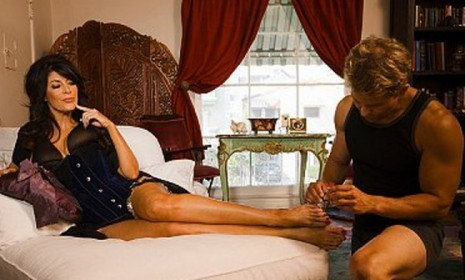Why 'cougars' have more fun
A new study confirms the existence of the "cougar," and says evolutionary forces push women in their 30s and 40s to be more sexual than their younger counterparts

A free daily email with the biggest news stories of the day – and the best features from TheWeek.com
You are now subscribed
Your newsletter sign-up was successful
TV sitcom writers didn't create "cougars" — evolution did, according to an article in the journal Personality and Individual Differences. Women who have passed their peak fertility years really are far more sexual than their younger counterparts. And the article's authors say that's because the experiences of our ancestors programmed them that way. Here's a quick guide:
What did the researchers find?
Women between the ages of 27 and 45 — those between their most fertile years and menopause — have more sex than younger women, and they have more active fantasy lives. They're also more likely to have casual sex, including one-night stands. And the authors of the study — University of Texas psychologist David Buss and graduate students Judith Easton (the lead author), Jaime Confer, and Cari Goetz — say that's because they're following the example of their ancestors.
The Week
Escape your echo chamber. Get the facts behind the news, plus analysis from multiple perspectives.

Sign up for The Week's Free Newsletters
From our morning news briefing to a weekly Good News Newsletter, get the best of The Week delivered directly to your inbox.
From our morning news briefing to a weekly Good News Newsletter, get the best of The Week delivered directly to your inbox.
How might evolution have programmed middle-aged women to want more sex?
Our ancestors lost as many as half of their children to disease, famine, and war, so they were programmed to produce as many children as possible. Men, the theory goes, were wired to seek as many partners as possible; women, Buss, Easton, and their co-authors say, were programmed to have more sex after their teens and 20s, when it became harder to get pregnant.
What are some of the faults with the study?
To test the evolution theory, the article authors surveyed 827 women about their sexual habits. But about 75 percent of the study participants were found via Craigslist, a website where many go seeking casual sexual encounters, so the test subjects might skew towards the promiscuous. And, as the article notes, there may be other reasons women in their 30s and 40s are more sexual. They might simply be more comfortable with sex and their sexuality than younger women. The study also didn't control for "hormonal birth control" like the pill, which can affect libido and is more widely used by younger women.
A free daily email with the biggest news stories of the day – and the best features from TheWeek.com
Sources: Time, Advice Goddess


